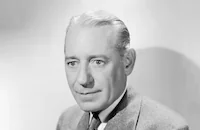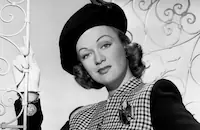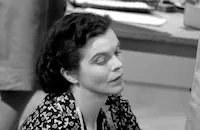Whistling in the Dark

Brief Synopsis
Cast & Crew
S. Sylvan Simon
Red Skelton
Conrad Veidt
Ann Rutherford
Virginia Grey
"rags" Ragland
Film Details
Technical Specs

Synopsis
Joseph Jones, the leader of Silver Haven, a phony Long Island cult, is informed by his lawyer, Jennings, that although one of his deceased followers has left a one million dollar estate to him, the interest will go to her nephew, Upshaw, until Upshaw's death. While Jones and his cohorts try to think of a way out of their dilemma, the butler, "Noose" Green, is listening to a radio broadcast of popular Wally Benton, who writes and performs murder mysteries in which his alter ego, "The Fox," solves seemingly perfect crimes. Jones's cohort, Beau Smith, gets the idea that Wally would be the perfect person to help them get rid of Upshaw. Meanwhile, Wally is about to elope with his longtime fiancée, Carol Lambert, but, because his contract is up for renewal, reluctantly agrees to his manager "Buzz" Baker's request that he go out once more with "Fran" Post, the sponsor's man-chasing daughter. That night, Jones and his men arrive at Wally's dressing-room, posing as manufacturers of a health tonic that rivals Post's, and promise to double his contract. They insist that he go with them and promise that both Carol and Fran will be notified that he has been detained. Wally soon realizes that Jones is not a sponsor and that he has been kidnapped. At Silver Haven, Jones informs Wally of his need for "the perfect crime" and coerces him to help by bringing the confused Fran and Carol to the estate. When the three are alone, they try to find a way out, but wind up in the same room as Jones after finding a secret passageway. Jones forces Wally to stay alone until he concocts the perfect murder as Upshaw will be flying to New York from Kansas City the next day. Meanwhile, Fran's father, Philip Post, has become worried and contacts Deputy Commissioner O'Neill, who thinks that Fran has eloped with Wally, much to Post's displeasure. The next morning, after Wally has successfully developed a perfect murder idea, he tries to bribe Noose with a radio contract to let them free, but Jones interrupts. Wally then happily explains his loophole-proof plan: the poison will be placed in Upshaw's tooth powder and after he gargles, all traces of the poison will disappear and the death will appear to be from heart failure. Jones is about to send his henchman, Gordon Thomas, to Kansas City to sneak the poison into Upshaw's toiletry case, but first tries out the powder on Noose, who immediately dies. Later, Wally secretly tells Fran and Carol that he substituted sugar for the poison, but when Thomas forgets Wally's packet, Jones's druggist, Herman, makes certain that Thomas receives a fresh poison packet. Some hours later, Upshaw boards his plane and Thomas sits across from him. At the same time, after fruitlessly trying to coerce or overwhelm their guard, Sylvester, Wally rigs a portable radio with a disconnected telephone wire and is able to contact a telephone operator, who signals Upshaw's plane. Because Thomas has tampered with the plane's communication system, Wally cannot warn Upshaw, but is able to have the operator connect him to his radio station and relate the facts as if they were part of his regular program. The radio staff and Mr. Post realize what is happening, as does Smith, who summons Jones to the estate. A child's radio eventually broadcasts the warning to Upshaw just as the police and Post arrive at Silver Haven. After the police arrest Jones and his gang, Wally finally speaks with Upshaw, who not only promises not to brush his teeth, but says he won't even take them out.

Director

S. Sylvan Simon
Cast

Red Skelton

Conrad Veidt

Ann Rutherford

Virginia Grey

"rags" Ragland

Henry O'neill

Eve Arden
Paul Stanton

Don Douglas

Don Costello
William Tannen
Reed Hadley
Mariska Aldrich
Lloyd Corrigan
George Carleton
Will Lee
Ruth Robinson
John Picorri
Joe Devlin
John Wald
Ken Christy
Betty Farrington
Paul Ellis
Dora Clement
James Adamson
Inez Cooper

Emmett Vogan
Barbara Bedford
Lester Dorr
Mark Daniels
Mel Ruick
Leon Tyler

Dorothy Adams
Jenny Mac
John Dilson
Billy Bletcher
Larry Steers
Ronnie Rondell
Brick Sullivan
Al Hill
Robert Homans
Crew
Harry Clork
Cedric Gibbons
George Haight
Frank E. Hull
Kalloch
Bronislau Kaper
Robert Macgonigle
Albert Mannheimer
Eddie Moran
Elliott Nugent
Al Raboch
Gabriel Scognamillo
Douglas Shearer
Sidney Wagner
Edwin B. Willis

Photo Collections
Videos
Movie Clip


Trailer
Hosted Intro
Film Details
Technical Specs

Articles
Whistling in the Dark -
In lining up a vehicle for Skelton, MGM dusted off an old property, a successful Broadway play of the same name written by Laurence Gross and Edward Childs Carpenter that the studio had brought to the big screen for the first time in 1933. Reprising the roles they had created onstage, Ernest Truex played the protagonist (a mystery writer rather than a radio personality) in the earlier film and Edward Arnold the villain, with direction entrusted to Elliott Nugent - who would, six years later, helm Paramount's The Cat and the Canary. Reworked by Robert MacGunigle, Harry Clork, and Albert Mannheimer, Whistling in the Dark was tailored to fit Skelton's comic aptitude; like Hope, Skelton's shtick was that of a cowardly hero whose manifest inadequacies add up, in the eleventh hour and against all odds, into a win for the good guys. Production began in June 1941 and wrapped four weeks later, with the film's west coast premiere set for August. Backing Skelton's play were Ann Rutherford (as the love interest), comic dolt Rags Ragland and, buried way down in the cast list, Eve Arden. (Skelton and Arden had made their film debuts in Having Wonderful Time in 1938.) The combination of chills and chortles pleased Metro and moviegoers alike and two follow-ups were ordered: Whistling in Dixie (1942) and Whistling in Brooklyn (1943), all of which reunited the now-proven comedy team of Skelton, Rutherford, and Ragland.
Though Skelton would make thirty-odd features as an MGM contract player, his true medium would prove to be in the burgeoning medium of television. Built into his MGM contract (a codicil his home studio would come to regret as the silver screen lost audiences to the cathode tube) was an opportunity for Skelton to flex his talents in radio (which he did as the star of his own show from 1941 until 1953) and TV. Making his small screen debut on NBC in 1951, Skelton moved The Red Skelton Show to CBS, where the program remained on the air (in one form or another) from 1953 until 1970; the variety show's final season was broadcast once again by NBC before Skelton's signoff in August 1971. Skelton's Whistling in the Dark castmate Eve Arden would also enjoy a long association with television, as the star of the long-running CBS comedy Our Miss Brooks (1952-1956), as well as The Eve Arden Show (1957-1958), The Mothers-In-Law (1967-1969), and as a frequent guest on The Red Skelton Hour.
By Richard Harland Smith
Sources:
Mystery Movie Series of the 1940s by Ron Backer (McFarland & Company, Inc., 2010)
Red Skelton: The Man Behind the Mask by Wes Gehring (Indiana Historical Society, 2013)

Whistling in the Dark -
Whistling in the Dark
Paramount Pictures, meanwhile, was having great success with films like The Cat and the Canary (1939) and The Ghost Breakers (1940), which surrounded their resident funnyman - Bob Hope with mystery, pretty girls, and dangerous situations. Former vaudeville comic Hope was known for snappy wordplay, of course, and was given plenty to react to in these films; the result was big box-office. Casting about for a similar vehicle for Skelton, producer George Haight and other MGM executives looked no further than the 1933 MGM film Whistling in the Dark, adapted from a stage play, which featured Ernest Truex as a mystery writer who, with his girlfriend, is held captive by a house full of gangsters and forced to come up with a sure-fire murder plot that head mobster Edward Arnold can use in real life.
For the 1941 Skelton remake, the story was "jazzed up" with several ingenious, modern touches. Instead of a mystery writer, our hero became a radio detective and the ordinary mobsters were turned into colorful cultists. The film opens at a cult ceremony at the creepy estate Silver Haven, where Joseph Jones (Conrad Veidt, sporting a thick German accent and a great name for a cult leader) conducts middle-aged women in Moon worshipping and spouts homilies like "we part in radiant contentment." Jones and his cronies discuss getting rid of the nephew of a departed follower in order to inherit her million-dollar estate. On the radio in the next room is a broadcast of The Grape-O Mix Crime Hour, featuring Wally Benton (Red Skelton) as crime solver "The Fox". Following the broadcast (during which we see the frantic goings-on of actors, sound effects men, and musicians hitting their cues like seasoned pros), Benton must deal with his own personal dilemma: he wants to pop the question to his long-time fiancée Carol Lambert (Ann Rutherford), but he is still cozying up to the sponsor's daughter, Fran Post (Virginia Grey). Benton's manager, 'Buzz' Baker (Eve Arden) has put him up to the deception. Jones and his gang show up for the West Coast broadcast that evening and corner Benton in his dressing room, pretending to be rival sponsors. Benton, Carol, and Fran are soon being held captive at Silver Haven, as the cultists demand that "The Master Brain of Murder" come up with a foolproof plan for eliminating the nephew that stands in the way of their million dollars.
In his Paramount scare comedies, Bob Hope may have had Paulette Goddard at his side, but in Whistling in the Dark MGM surrounds Skelton with no fewer than three attractive co-stars. Rutherford, Grey, and Arden are also given a chance to share in the comedy bits, although Skelton is clearly the focus of attention. Rutherford later recalled the director of all three Whistling movies, S. Sylvan Simon: "Sylvan had one terrible problem. He could not control his laughter, at least when Red was at the helm." Simon was fine during rehearsals, Rutherford said, but "...when it came time to shoot it, out of my peripheral vision I would see Sylvan sitting in his canvas chair, tears streaming down his face and a handkerchief wadded in his mouth. Because Red knew what a patsy he had in Sylvan and he would invariably come up with another little bit of business that hadn't been rehearsed before and Sylvan had to be quiet or he'd ruin the take."
In the New York Times Bosley Crowther wrote that "[Whistling in the Dark] is a lively and amusing film, continuously creepy and comic and properly loaded with gags." Crowther was suitably impressed with the nation's newest comedy star, saying that "Metro has really turned up an impressive young Bob Hopeful... Mr. Skelton is another of those blithe and easy gag-busters whose careless way with a line is a thing to be greatly enjoyed and whose use of the double-take is a studied accomplishment. When his mind snaps his muscles taut in a moment of dire emergency, when the impact of a threat sinks in after slight delay, he stiffens like a man grabbing hold of a highly charged wire. And his face becomes a mask of comic horror. Mr. Skelton shocks beautifully and often."
Variety wrote that "[Skelton's] timing and delivery of laugh lines and situations despite the familiar hoke injected catches maximum audience reaction." The industry magazine offered that the comedian "...displays possibilities of future starring comedy importance if provided with proper material from here in." Time magazine said that Skelton "manages to produce considerable hilarity" and said, "[Whistling in the Dark is] not the funniest picture out of Hollywood. But it has enough effective low comedy to ease M.G.M.'s brand-new cinecomic down the ways without swamping him."
Skelton enjoyed a long career at MGM, committing more of his vaudeville routines to celluloid in such musicals as Lady Be Good (1941) and Ship Ahoy (1942). Although the comedian was ultimately more at home doing sketch comedy on radio and television, MGM provided several top-notch feature length vehicles for Skelton, such as A Southern Yankee (1948) and The Yellow Cab Man (1950). Along the way, two sequels to the popular Whistling in the Dark were released, Whistling in Dixie (1942) and Whistling in Brooklyn (1943), both featuring Skelton as "The Fox" and Ann Rutherford as his perpetual fiancée.
Producer: George Haight
Director: S. Sylvan Simon
Screenplay: Robert MacGunigle, Harry Clork, Albert Mannheimer; Laurence Gross, Edward Childs Carpenter (play); Eddie Moran, Elliott Nugent (uncredited, contributing writer)
Cinematography: Sidney Wagner
Art Direction: Cedric Gibbons
Music: Bronislau Kaper
Film Editing: Frank E. Hull
Cast: Red Skelton (Wally Benton), Conrad Veidt (Joseph Jones), Ann Rutherford (Carol Lambert), Virginia Grey ('Fran' Post), 'Rags' Ragland (Sylvester), Henry O'Neill (Philip Post), Eve Arden ('Buzz' Baker), Paul Stanton (Jennings), Don Douglas (Gordon Thomas), Don Costello ('Noose' Green), William Tannen (Robert Graves), Reed Hadley (Beau Smith), Mariska Aldrich (Hilda), Lloyd Corrigan (Harvey Upshaw), George Carleton (Deputy Commissioner O'Neill), Will Lee (Herman), Ruth Robinson (Mrs. Robinson)
BW-78m. Closed Captioning.
by John M. Miller
Whistling in the Dark
Quotes
Help yourself to some of your father's product.- Buzz
Not me. That's what killed mama.- Fran
He's smart, boss. I listen to him every night.- Green
Doesn't seem to have done you much good.- Jones
Well, I feel like a new woman. In fact, I feel like a new man. Bring me a telephone book.- Buzz Baker
How many?- Waiter
Three.- Buzz Baker
You said three?- Waiter
I hope we're being followed.- Buzz Baker
One gentleman for three ladies?- Waiter
Oh, it's all right. I'm just going to watch.- Buzz Baker
Trivia
Notes
Whistling in the Dark marked comedian Red Skelton's first starring film role. It was also the first of three films in M-G-M's "Whistling" series, all of which starred Skelton as "Wally Benton," Ann Rutherford as his fiancée, "Carol Lambert," and "Rags" Ragland, who played "Sylvester" or his twin brother "Chester." The other two films were Whistling in Dixie (1942) and Whistling in Brooklyn (1943). All three films were directed by S. Sylvan Simon. A fourth film, Whistling in Hollywood, was planned in late 1943, but was never made. M-G-M had previously filmed a version of the Laurence Gross-Edward Childs Carpenter play in 1933. That version, also called Whistling in the Dark, was directed by Elliott Nugent and Charles Riesner and starred Ernest Truex, Una Merkel and Edward Arnold. (see AFI Catalog of Feature Films, 1931-40; F3.5074).
















